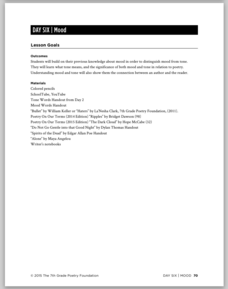Curated OER
Pretty Plants Point of View
Young poets use Kidspiration to draw a flower, personify the flower, and write a poem from the flower's point of view. Sharing these poems in small groups will reinforce learners' knowledge of personification.
Curated OER
Creative Writing: Haiku
Haikus by Basho, Buson, Issa, and Shiki are used as models for a brief lecture on the importance of poetry in Japan's history and the structure of this poetic form. Students then go on a nature walk, record impressions, and return to the...
Curated OER
Mini Beasts and Dialect
Discover the differences in dialect. Inquisitive minds read poems and discuss how words or phrases are different in standard English and other dialects. Using a dictionary, class members locate the definition of each word, find...
Curated OER
Haiku Movies
Pupils create a movie to illustrate an original haiku poem in this upper-elementary school, Language Arts lesson utilizing technology. The lesson meets state standards for Language Arts and includes a materials list and possible lesson...
Curated OER
Pirate Poems
Students increase their awareness of the fundamental of poetry. They write their own poetry on a familiar topic. Students create a paper-bag puppet on which to display their poem. They are told that poetry is a special way to tell a story.
Curated OER
Fluency Is Too Cool for School
What does a successful reader sound like? Help readers gain fluency and become successful readers through repeated readings of given poems. They use the cover-up method to help them decode new words and chart their progress as they...
Curated OER
Biopoem
Reinforce the actions, emotions, and characteristics that determine what a character is like by having your middle schoolers create a biopoem using the model presented here. You could engage them first by having them write a poem about...
Curated OER
Guided Reading: Three Little Pigs (Plus Wolf: Javalinas)
Guide your class through reading various versions of The Three Little Pigs. Talk about the traditional story line and then discuss a different point of view: Maybe the wolf was just an innocent bystander! This lesson plan, which has...
Denver Art Museum
Putting Images into Words
Engage your class in art analysis of Indian Look-Alike by Melanie Yazzie. Using this work of art as inspiration, writers compose a poem or short story. After a peer review session, the teacher conveys information about the work of art as...
Curated OER
A Poem's Theme
Show young poets how to use the main idea and voice to determine the theme of a poem. Model the steps using Listen Children. Lucille Clifton’s This Morning provides guided practice. Finally, class members use Nikki Giovanni’s Legacies...
Curated OER
The Poetics of Hip Hop
The Bard, Nikki Giovanni, Mos Def? “Sonnet 18,” Ego Tripping,” and “Black on Both Sides”? Sure! It’s the poetics. Class members compare the lyrics, rhythm, and rhyme in classic poetry to hip-hop in a richly detailed resource that...
Curated OER
Producing Beats
Turn your classroom into a music studio as groups work together to determine why music sounds different when performed live versus a recording. After listening to some different music, each group picks a poem, creates a recording, and...
Curated OER
Do You Want to Be My Friend?
Learners participate in a variety of emergent and early-literacy activities based on a "friendship" theme. Learners listen to the book Do You Want to Be My Friend by Eric Carle, then echo read, choral read, and independently read...
Curated OER
Poetic Elements Are Fun!
Engage your class in the elements of poetry with a series of lessons and activities. The plans cover simile, metaphor, personification, onomatopoeia, alliteration, and imagery. Learners come up their their own metaphors, identify poetic...
Facing History and Ourselves
Hardship and Hope: Teaching Amanda Gorman's "New Day's Lyric"
Class members come together to study Amanda Gorman's poem "New Day's Lyric." After a close reading of the poem, learners watch a video of Gorman reading her poem, and then craft additional lines for the poem where they offer suggestions...
National Endowment for the Humanities
“The Great Migration” by Minnie Bruce Pratt
Minnie Bruce Pratt's poem, "The Great Migration," offers young scholars an opportunity to reflect on how where we come from influences who we are. Groups conduct a close reading of the poem, recording observations about the poem's...
Poetry Out Loud
The Tabloid Ballad
What do the theme song from Gilligan's Island, the nursery rhyme "The Owl and the Pussy-Cat," and the poem "The Shooting of Dan McGrew" all have in common? Why, they're ballads of course! Challenge your young balladeers to compose their...
EngageNY
Looking Closely at Stanza 1—Identifying Rules to Live By Communicated in “If”
Here is a lesson plan in which pupils connect themes and rules to live by from the story Bud, Not Buddy by Christopher Paul Curtis to those found in the poem If by Rudyard Kipling. First, scholars discuss their reading and review Bud's...
ReadWriteThink
Writing Free Verse in the "Voice" of Cesar Chavez
Introduce middle schoolers to free verse poetry with a lesson that has young poets read two free verse poems and list the common characteristics of the form. They then read a passage from Cesar Chavez's biography and a free verse poem...
National Endowment for the Humanities
"From Citizen, VI [On the Train the Woman Standing]," Claudia Rankine
Claudia Rankine's poem "From Citizen, VI [On the Train the Woman Standing]," asks readers to consider direct and more subtle forms of prejudice. After discussing the format of the poem, its tone, and the emotions expressed, class members...
Curated OER
Reflection
The tenth lesson in the 12-part poetry unit asks seventh graders to reflect on their learning about poetry and share their work with other poets.
Curated OER
Mood
Young scholars learn how to distinguish between the mood of a piece of writing (how the work makes the reader feel) and the tone (the writer's attitude toward the material) in the sixth lesson in a poetry unit. After watching two very...
EngageNY
Introducing “If” and Noting Notices and Wonders of the First Stanza
After reading chapter 14 of the story Bud, Not Buddy by Christopher Paul Curtis, scholars take part in a read-aloud of the poem If by Rudyard Kipling and compare it to the reading of Bud, Not Buddy. Learners then go deeper into the poem...
EngageNY
Notices, Wonders, and Vocabulary of the Third Stanza of “If”
How does one's experience reading a poem's text differ from listening to its audio version? Delve into the insightful question with the poem, If by Rudyard Kipling, as pupils compare and contrast their experience using a note-taking...
Other popular searches
- Poetry Analysis
- Poetry Alliteration Examples
- Poetry Alliteration
- Writing Poetry
- Concrete Poetry
- Poetry Unit
- Introduction to Poetry
- Poetry Lesson Plans
- African American Poetry
- Figurative Language Poetry
- Free Verse Poetry
- 6th Grade Poetry Unit


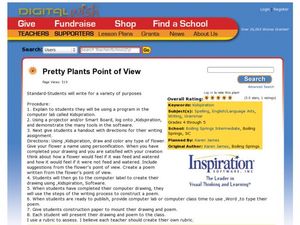




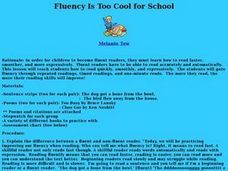



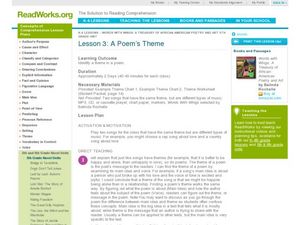




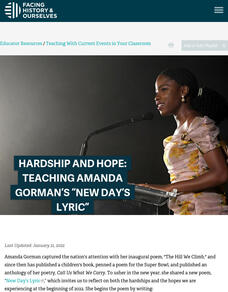

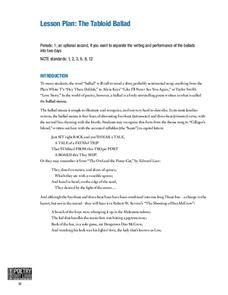

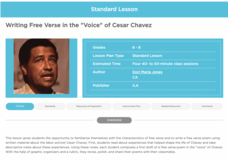
!["From Citizen, VI [On the Train the Woman Standing]," Claudia Rankine Lesson Plan "From Citizen, VI [On the Train the Woman Standing]," Claudia Rankine Lesson Plan](http://content.lessonplanet.com/resources/thumbnails/456347/large/u2nyzwvuc2hvdf8ymdizltazlte3x2f0xzeyljexljq2x1bnlnbuzw.png?1679080322)

